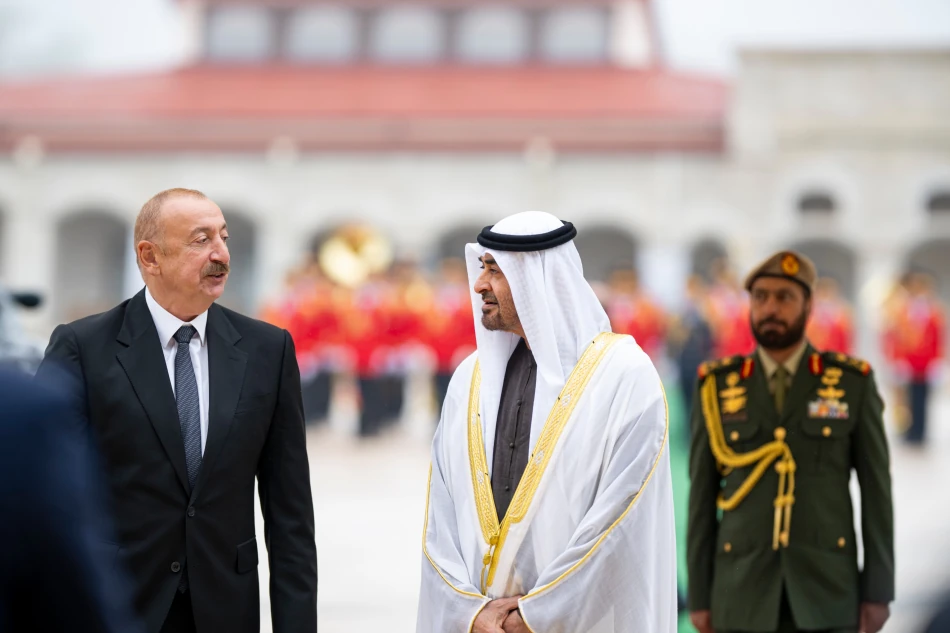
UAE's Unwavering Commitment to Peace and Stability in the Caucasus: Mohammed bin Zayed
UAE-Azerbaijan Economic Partnership Deepens as Leaders Meet in Karabakh
UAE President Sheikh Mohammed bin Zayed Al Nahyan and Azerbaijan President Ilham Aliyev have reinforced their countries' comprehensive economic partnership during high-level talks in Karabakh, focusing on expanding cooperation in renewable energy, food security, and cultural exchanges. The meeting underscores the UAE's growing influence in the South Caucasus region and signals deeper Middle Eastern investment in post-conflict Azerbaijan.
Strategic Partnership Takes Shape
The bilateral discussions centered on implementing the comprehensive economic partnership agreement signed between the two nations in July 2024. President Aliyev welcomed Sheikh Mohammed's visit as providing "strong momentum" for cooperation across multiple sectors, while the UAE leader emphasized his commitment to elevating bilateral relations to new heights of economic and investment collaboration.
Sheikh Mohammed described the July partnership agreement as representing a "qualitative leap" in economic relations between the two countries, with significant impact on achieving their shared developmental goals.
Focus on Future-Oriented Sectors
The leaders prioritized cooperation in several key areas that align with global economic trends. Renewable energy emerged as a central theme, reflecting both countries' strategies to diversify their energy portfolios. The UAE's experience in solar energy development and Azerbaijan's traditional energy expertise create complementary opportunities for joint ventures.
Food security discussions take on particular relevance given global supply chain disruptions and the UAE's strategic goal of enhancing domestic food production capabilities. Azerbaijan's agricultural potential, combined with UAE investment and logistics expertise, could create new regional food supply networks.
Regional Stability and Geopolitical Positioning
The choice of Karabakh as the meeting location carries symbolic weight, demonstrating the UAE's recognition of Azerbaijan's sovereignty over the formerly disputed territory. Sheikh Mohammed expressed the UAE's significant interest in Caucasus stability and voiced hope for continued positive developments in the Azerbaijan-Armenia peace process.
This positioning aligns with the UAE's broader regional strategy of maintaining constructive relationships across different conflict zones while supporting stability through economic engagement rather than military intervention.
Cultural Diplomacy as Economic Foundation
Both leaders emphasized cultural cooperation as an important dimension of their relationship, viewing cultural exchange as a "civilizational bridge" between peoples. This approach reflects the UAE's soft power strategy, using cultural initiatives to build long-term economic partnerships.
The cultural component serves practical purposes, facilitating business relationships and creating frameworks for educational exchanges that could support future economic collaboration.
Market Implications and Investment Opportunities
For international investors, the UAE-Azerbaijan partnership represents emerging opportunities in several sectors. Azerbaijan's post-conflict reconstruction needs, combined with UAE capital and expertise, could create attractive investment vehicles, particularly in infrastructure development and renewable energy projects.
The partnership also signals the UAE's continued strategy of diversifying its international economic relationships beyond traditional Gulf and Western partners, potentially reducing geopolitical risks while accessing new markets.
Trade volumes between the two countries, while currently modest, could see significant growth given the comprehensive nature of their economic agreement and the high-level political commitment demonstrated by this meeting.
Looking Forward
The talks concluded with both leaders emphasizing their commitment to leveraging available opportunities for sustainable development in both countries and regional stability. The presence of senior officials from both sides, including Sheikh Hamdan bin Mohammed bin Zayed Al Nahyan and several ministers, indicates institutional commitment beyond personal diplomatic relationships.
This partnership reflects broader trends in Middle Eastern diplomacy, where economic cooperation increasingly drives political relationships, and smaller nations like the UAE punch above their weight through strategic investment and diplomatic engagement.
Most Viewed News

 Sara Khaled
Sara Khaled






